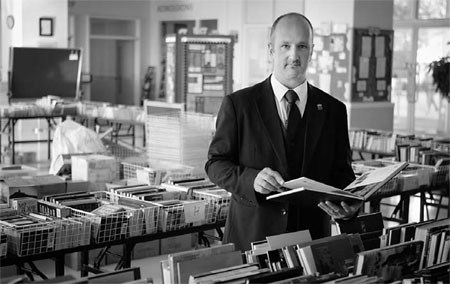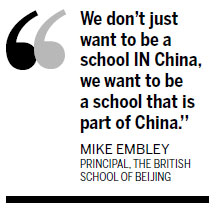Passion for teaching English-style grows in Beijing suburbs
Updated: 2012-10-07 11:46
By Jonathan Stefonek (China Daily)
|
||||||||
 |
|
Mike Embley, principal of the British School of Beijing in suburban Shunyi, tries to maintain high standards. Kuang Linhua / China Daily |
Mike Embley may owe his China experience to a senior teaching colleague at a British grammar school who never came here.
"My original career was in medical sciences," says the principal of The British School of Beijing in the suburb of Shunyi district. "Then I spent a couple years in my youth as a musician, and then went to teaching because it was something that I had always been interested in."

"There was an elderly gentleman sitting in the back of the staff room in his chair - it had been his chair for 40 years - saying, 'I remember when I taught her mother, and she was just the same.' And I thought to myself, I can't stay in one place for 40 years!"
He didn't.
Embley and his wife agreed they should travel while they were still young, a decision that took them to The British School in Taiwan for three years ("Loved it!"). Next they spent two years in Venezuela and four in Norway, where they adopted a little girl from China.
"We had always liked China from our time in Taiwan," he says, so the family went looking for an opportunity to come to the mainland. The same school offered a post in Shanghai for a year, then five years ago they came to Beijing.
"We just adopted another little girl, finalized three months ago," Embley says of the family's fifth child. "She's been with us a while, from one of the orphanages that the school supports." She had some medical issues that Embley helped with, and then on one visit to the orphanage his wife went along and "that was it - done - she was coming home with us."
The British School operates more formally than the larger international schools in Shunyi, a fact that Embley feels is important, though not for everyone.
"School uniform, 'please', 'thank you', 'good morning', 'good afternoon', 'standing when adults enter a room', formal dining all that fills some people with absolute horror, and that is absolutely fine."
The British School addressed that particular need, he says, and then grew quite quickly to become the second largest international school in Beijing. But, "obviously the Chinese schools would dwarf all the international schools."
"If you look at the big three - International School of Beijing, Western Academy Beijing, and our school - waiting lists are reasonably extensive. If you drop down a tier, you will find capacity there. And if you drop down another tier, and obviously, I'm not going to name any of those schools, you'll find fairly extensive capacity."
On arrival in Beijing, Embley was charged with bringing The British School into the Nord Anglia Group, one of the largest providers of education to the UK Ministry of Defense and governments around the world.
While all that may sound a bit "stiff upper lip", Embley's office has a looser vibe.
There's a drum set tucked in one corner, where the principal gets in a little kit time most days. "I'm an early riser, so I'll come in before the admin staff who would yell at me," he says, laughing. "Usually I'll do a half hour in the mornings and an hour or so in the evenings."
And then there's the pile of weaponry in another corner.
"For a long time in my youth, I did a Japanese martial art called kenjitsu so now I teach the students sword fighting using these," he says, grinning as he takes up a sword. "And these are safe weapons essentially, see? They hurt, but they don't break your bones.
"They're also used by live role-players oddly enough. They high-jacked the technology as it were. We can fight without armor... because it is a full contact martial art I'm not going to hit you," he promises, swinging a foam sword toward my neck. "So they can hit each other in the head. Then they move onto these that offer a little bit closer weight to the metal swords."
There is archery hardware, too, reflecting another skill Embley likes to share.
"It is very easy in my position to be a remote principal and to sit behind my ridiculously pompous desk and not see the students but then I don't actually know the temperature of the school," he says. "If I don't walk around the school, I don't see - Are we maintaining our standards? Are we offering what we should do?" So Embley uses archery and sword fighting "and I teach some classes from time to time" to stay connected to student life.
"We don't just want to be a school IN China, we want to be a school that is part of China," he says, and is proud that the school has been chosen by the Chinese government to provide training to Chinese teachers. The British School of Beijing is also bringing in teachers from rural parts of China and sending its teachers to rural parts of China to work.
"There is plenty that a school like this can learn from the best Chinese schools, and equally, we hope, we can share some of our best practices with them because, 'why not?' it benefits our students, it opens the eyes of our teachers, our staff, and me.
"We want to get away from the idea as Winston Churchill once put it: 'I am very lucky to have been born British, it's the very best,'" the principal says. "That was then, and this is now. It's an exchange."
For China Daily

 'Taken 2' grabs movie box office crown
'Taken 2' grabs movie box office crown
 Rihanna's 'Diamonds' tops UK pop chart
Rihanna's 'Diamonds' tops UK pop chart
 Fans get look at vintage Rolling Stones
Fans get look at vintage Rolling Stones
 Celebrities attend Power of Women event
Celebrities attend Power of Women event
 Ang Lee breaks 'every rule' to make unlikely new Life of Pi film
Ang Lee breaks 'every rule' to make unlikely new Life of Pi film
 Rihanna almost thrown out of nightclub
Rihanna almost thrown out of nightclub
 'Dark Knight' wins weekend box office
'Dark Knight' wins weekend box office
 'Total Recall' stars gather in Beverly Hills
'Total Recall' stars gather in Beverly Hills
Most Viewed
Editor's Picks

|

|

|

|

|

|
Today's Top News
Health new priority for quake zone
Xi meets US top military officer
Japan's boats driven out of Diaoyu
China mulls online shopping legislation
Bird flu death toll rises to 22
Putin appoints new ambassador to China
Japanese ships blocked from Diaoyu Islands
Inspired by Guan, more Chinese pick up golf
US Weekly

|

|







